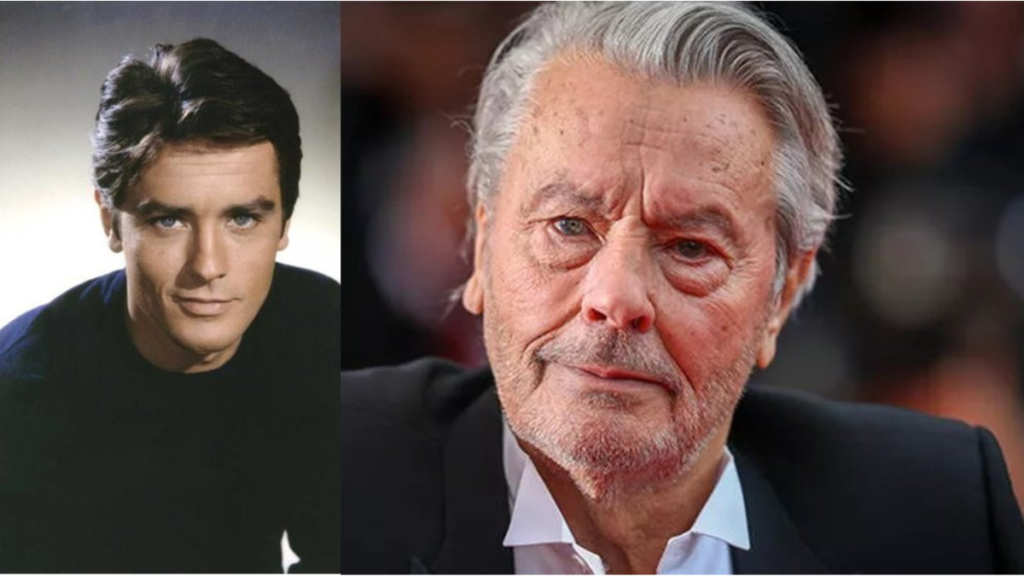Welcome to the mesmerizing world of Alain Delon, a name synonymous with timeless elegance and undeniable talent in French cinema. With his smoldering looks and charismatic presence on-screen, Delon captivated audiences around the globe for over six decades. From his early breakthroughs to his collaborations with legendary directors, this enigmatic actor has left an indelible mark on the silver screen. Join us as we delve into the life and career of Alain Delon, exploring his iconic roles, controversies, fashion influence, and enduring legacy in French cinema. Prepare to be captivated by the extraordinary journey of a true cinematic icon – Alain Delon!
Early life and rise to fame
Alain Fabien Maurice Marcel Delon, better known as Alain Delon, was born on November 8, 1935, in Sceaux, a commune in the southern suburbs of Paris. Raised by his adoptive parents after being abandoned by his birth mother at an early age, Delon grew up with a passion for the arts.
In his late teens, Delon served in the French military during the Algerian War. It was during this time that he discovered his love for acting and decided to pursue it as a career. After completing his military service, he enrolled at the National Conservatory of Dramatic Art in Paris.
Delon’s striking looks and undeniable talent quickly caught the attention of filmmakers and casting directors. In 1957, he made his film debut in “Quand la femme s’en mêle” (When Women Meddle), but it wasn’t until two years later that he gained significant recognition with Jean-Pierre Melville’s crime thriller “Le Samouraï.” This breakout role established him as one of France’s most promising young actors.
Throughout the 1960s and 1970s, Delon starred in a series of critically acclaimed films such as Luchino Visconti’s “Rocco e i suoi fratelli” (Rocco and His Brothers) and Michelangelo Antonioni’s “L’Eclisse” (The Eclipse). He collaborated with renowned directors like Jean-Luc Godard (“Pierrot le Fou”) and René Clément (“Purple Noon”), solidifying his status as an international film star.
However, it wasn’t just Delon’s acting prowess that captivated audiences; it was also his enigmatic presence on screen. With piercing blue eyes and brooding masculinity, he exuded charisma like no other. He effortlessly transitioned from playing suave and sophisticated characters to troubled anti
Iconic roles and collaborations with famous directors
Alain Delon’s career in French cinema is marked by his unforgettable iconic roles and collaborations with some of the most renowned directors in the industry. From brooding anti-heroes to charming playboys, Delon effortlessly brought complexity and depth to each character he portrayed.
One of his most notable collaborations was with director Jean-Pierre Melville, who recognized Delon’s raw talent and cast him as the lead in “Le Samouraï” (1967). This neo-noir crime film solidified Delon’s status as a leading man and showcased his ability to captivate audiences with minimal dialogue and intense on-screen presence.
In another collaboration, Delon joined forces with Luchino Visconti for “The Leopard” (1963). Playing the role of Tancredi Falconeri, a young nobleman caught in political turmoil during Italy’s unification period, Delon displayed a remarkable range of emotions that earned him critical acclaim.
Delon also worked closely with Michelangelo Antonioni on “L’Eclisse” (1962), exploring themes of alienation and existentialism. His portrayal of a disillusioned stockbroker struggling to find meaning in life added yet another layer to his already impressive repertoire.
Alain Delon made waves when he teamed up with director René Clément for “Purple Noon” (1960), an adaptation of Patricia Highsmith’s novel “The Talented Mr. Ripley.” His charismatic performance as Tom Ripley showcased his ability to seamlessly transition between charm and menace – a testament to his versatility as an actor.
These collaborations not only solidified Alain Delon’s status as one of French cinema’s greatest actors but also demonstrated his willingness to take risks and explore different genres. Each role allowed him to showcase his unique blend of intensity, vulnerability, and charisma – qualities that have made him an enduring icon in the world of film.
Controversies and personal life
Controversies and personal life have always been a part of Alain Delon’s fascinating journey in the spotlight. While he gained immense popularity for his acting prowess, his off-screen persona often made headlines as well.
One aspect that sparked controversy was Delon’s love life. He was known for his relationships with some of the most beautiful women in the world, including Romy Schneider and Nathalie Delon. However, his tumultuous relationships also brought about public feuds and scandals.
In addition to his romantic entanglements, Delon has faced criticism for his political views. He openly expressed admiration for far-right politicians, which led to backlash from both fans and fellow actors. Despite this controversy, Delon remained unapologetic about his beliefs.
There have been allegations against him regarding involvement with organized crime syndicates. These claims have added another layer of intrigue to the enigmatic actor’s personal life.
Despite these controversies, it is undeniable that Alain Delon’s talent on screen continues to captivate audiences worldwide. His contribution to French cinema cannot be overshadowed by scandal or gossip.
Delving into an individual’s personal life can often be complex and subjective; however, it is important to acknowledge that celebrities are multifaceted individuals who live their lives under constant scrutiny. In the case of Alain Delon, controversies may surround him but they do not define him as an artist or diminish the impact he has had on French cinema.
Legacy and impact on French cinema
Alain Delon’s impact on French cinema is nothing short of legendary. With a career spanning over six decades, he has left an indelible mark on the industry and continues to influence filmmakers and actors alike.
Delon’s intense performances in films such as “Le Samouraï” and “Purple Noon” showcased his unique ability to embody complex characters with depth and nuance. His magnetic presence on-screen captivated audiences around the world, earning him critical acclaim and numerous awards.
Not only did Delon collaborate with some of the most esteemed directors in French cinema, including Jean-Pierre Melville and Luchino Visconti, but he also paved the way for future generations of actors by setting new standards for excellence.
Beyond his acting prowess, Delon influenced French cinema through his production company, which allowed him to take creative control over projects that resonated with his artistic sensibilities. This entrepreneurial spirit further solidified his status as a trailblazer in the industry.
Delon’s legacy extends beyond just film. His iconic style both on and off-screen made him a fashion icon, influencing trends throughout the years. From tailored suits to classic sunglasses, his effortlessly cool aesthetic became synonymous with timeless elegance.
Moreover, Delon’s cultural impact cannot be ignored. He became an emblem of masculinity during a time when traditional gender roles were being challenged. His rugged charm combined with vulnerability offered audiences a fresh perspective on what it meant to be a leading man.
Delon’s influence on fashion and pop culture
Alain Delon, with his undeniable charm and timeless style, has left an indelible mark on both fashion and pop culture. His influence in these realms is evident from the moment he burst onto the silver screen.
Delon’s suave persona and impeccable sartorial choices captivated audiences around the world. Whether it was a tailored suit or a casual ensemble, his clothing choices exuded elegance and sophistication. People started to emulate his distinctive style, making him a trendsetter for generations to come.
In addition to shaping fashion trends, Delon also made waves in pop culture. His magnetic presence onscreen garnered widespread admiration and adoration from fans of all ages. He became an icon of masculinity, embodying the quintessential leading man archetype that continues to inspire actors today.
Beyond cinema, Delon’s impact extended into other forms of media as well. His striking features and charismatic allure were often featured in magazines and advertisements worldwide. He became a muse for renowned photographers and designers who sought to capture his enigmatic essence through their lenses.
Moreover, Delon’s influence transcended borders as he gained popularity not only in France but also internationally. His films introduced French cinema to audiences across the globe while simultaneously showcasing European fashion sensibilities onscreen.
To this day, Alain Delon remains an enduring symbol of sophistication and style—a true icon whose legacy continues to shape contemporary fashion trends and popular culture references alike.
Conclusion
Alain Delon’s impact on French cinema is undeniable. From his early rise to fame to his iconic roles and collaborations with renowned directors, Delon has left an indelible mark on the industry. Despite controversies and personal challenges, he has managed to maintain his status as a beloved figure in both film and popular culture.
Delon’s talent and dedication have earned him numerous accolades throughout his career, including the César Award for Best Actor in 1985. His performances in films like “Le Samouraï” and “Purple Noon” showcase his ability to captivate audiences with his enigmatic presence. Directors such as Jean-Pierre Melville and Luchino Visconti recognized Delon’s unique charisma, frequently casting him in their works.







